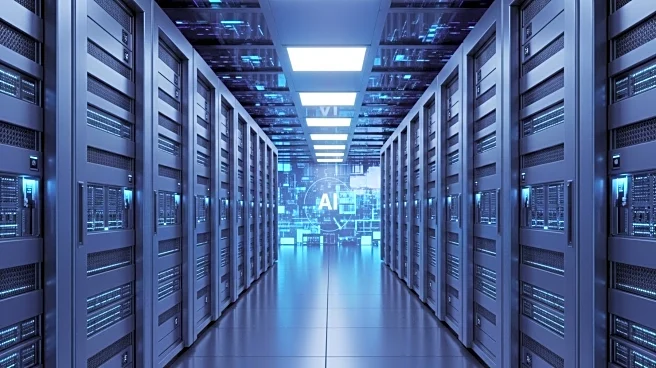What's Happening?
Hyperscale Data, Inc. has announced the expansion of its Michigan Data Center to accommodate additional capacity for artificial intelligence solutions. The company is converting a portion of the facility's space and power to support AI operations, while maintaining its Bitcoin mining activities. The Michigan Facility, which spans 34.5 acres and utilizes approximately 28 megawatts, will see the installation of NVIDIA Blackwell servers as part of the phased buildout. This move is part of Hyperscale Data's strategy to create a dual-use AI and blockchain compute facility in the United States.
Why It's Important?
The expansion of Hyperscale Data's Michigan Facility reflects a growing trend in the industry where data centers are evolving to support both blockchain and AI technologies. This development is significant as it highlights the increasing demand for AI infrastructure, which is crucial for enterprises and various industries. By leveraging its scale and technical expertise, Hyperscale Data aims to provide secure and scalable compute power, which could enhance the company's competitive edge in the digital infrastructure market. The uninterrupted Bitcoin mining operations ensure continued revenue generation during the transition.
What's Next?
Hyperscale Data plans to continue its expansion efforts, with the installation of NVIDIA Blackwell servers being a key component of the phased buildout. The company is also preparing for the divestiture of its subsidiary, Ault Capital Group, Inc., expected in the first quarter of 2026. This divestiture will allow Hyperscale Data to focus more on high-performance computing services and digital asset management. Stakeholders and investors are encouraged to follow the company's public filings and press releases for further updates.
Beyond the Headlines
The conversion of Hyperscale Data's Michigan Facility into a dual-use AI and blockchain compute center could have broader implications for the industry. It may set a precedent for other data centers to adopt similar models, thereby accelerating the integration of AI technologies into existing digital infrastructure. This shift could lead to increased innovation and efficiency in data processing and management, benefiting various sectors including finance, healthcare, and technology.









